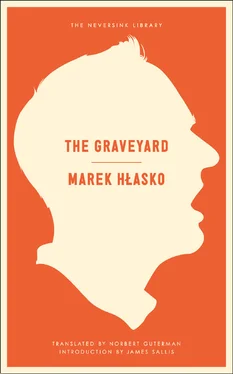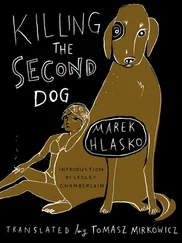He drew aside just in time: a heavy brass weight flew by a few inches from his face. The windowpane tinkled; the roar of the engines surged into the room with new intensity.
“Bastard!” Franciszek hissed, coming close to the other, his fingers outspread like claws. “You! Our First Secretary! Talking like that! I’ll show you … tomorrow … at the meeting. I’ll tell everybody …” He walked toward the door through a roaring red haze.
“Franciszek!” the other cried. “Franciszek, but I haven’t—”
As the door opened, he ran into Blizniaczek.
THE MEETING OF THE PARTY ORGANIZATION OF the “For a Better Tomorrow” automobile repair shop opened at five the next afternoon. Franciszek barely had time to eat his dinner in the canteen and to wash up. Buttoning his coat on the way, he ran to the crowded meeting room. The hall was too small for the crowd, and there was so much smoke that the open, smiling faces of the dignitaries in the portraits on the wall were scarcely visible behind the thick haze; and in the joyful faces of the Stakhanovites, boys and girls, there was something mysterious, unfathomable, as in the faces in portraits by old masters. At the table, covered with red cloth of the kind used for flags — it was riddled with cigarette holes — sat the First Secretary, Comrade Pawlak; his deputy, a young engineer with a face that twitched like a rabbit’s; two members of the Executive Committee; and a delegate from the party’s district organization. Franciszek pushed his way through the chairs, found an empty one, and sat down. His case was the third item on the agenda. The First Secretary silenced the room by an imperious motion of his hand, and rose. “I declare the meeting open.” He held out his hands to applaud, but before he had brought them together the whole room was clapping. This went on a long while. Then the applause subsided.
“Since there are no objections, the meeting is open,” he said, and his ringing voice filled every corner of the smoky room. “On the agenda we have the self-criticism of Comrade Jablonka, the cases of comrades Gierwatowski and Kowalski, ad lib motions, and discussion. Does any comrade wish to supplement the agenda?”
Before anyone had time to reply, he clapped his hands. The general applause lasted several minutes. Then Comrade Jablonka took the floor.
“Comrades,” he began in a high, tense voice. “I’ll simply say, in our working-class way, that I went off the deep end. No matter what anyone thinks and thinks, the best thing for a decent man is to admit right away, I went off the deep end, and that’s all there is to it. Sometimes a man thinks to himself, Maybe I ought to do this or that; but I’m not like that; I speak straight in our workingman’s way — I went off the deep end, and that’s all there is to it. Thoughts of all kinds come to me. I don’t know why. And yet a man sometimes thinks this or that, and it turns out that he has gone off the deep end. So I’ll simply say like a workingman — I went off the deep end, and that’s that.” He raised his voice. “Comrades,” he cried. “There was starvation, there was capitalism, there was misery: people were hungry, bloated, I saw it myself, with my own eyes, comrades. Then along came a man named Lenin. And the people woke up, comrades. And we ourselves know how things are, and we also know that they’ll be better. And I went off the deep end, comrades. When I was little, I tore wings from beetles and from flies; and I did things with cats and frogs that — well, to put it bluntly — I had fun that wasn’t our kind, the workers’ kind. Once a man died under my window. And it’s well known, comrades, that Comrade Stalin said: ‘Man — the word has a proud ring.’ There were terrible times. There was starvation, and misery, and capitalism; until a man named Lenin came along. And once again, comrades — my shop will deliver the shovels on time.”
He stopped. The audience awoke. The room shook with cheers. Everybody was clapping. Even those who had been overcome by sleep at the beginning of the meeting looked about them with wide-open bewildered and terrified eyes, and clapped harder than the others, trying to wake up as quickly as possible, to drive the last shreds of sleep from their eyelids, and to participate in the life of the meeting. Some comrades had tears in their eyes, and were sniffling loudly, reaching for their handkerchiefs. The aged leader of the solderers’ group awoke too late; rubbing his eyes violently, he cried, “Long live—” Someone added at once, “Long live the Soviet solderers — the builders of the Dneprostroi!” The cry was at once taken up by the entire audience, and for several minutes shouts went up from a hundred throats in honor of the builders of the Dneprostroi, Magnitogorsk, and Komsomolsk; of the Donbas miners; of the Kuban Cossacks; the Ukraine kolkhozniks; the Byelorussian guerrillas; the Soviet scientists; the Sevastopol sailors; the heroic defenders of Stalingrad; the explorers of the Arctic Circle; Lysenko, Michurin, and Olga Lepeshchinskaya; the clamor concluded with hurrahs in honor of Joseph Stalin’s works in the field of linguistics.
After Jablonka’s self-criticism, the atmosphere in the room grew warm and cordial. People smiled at each other, exchanged cigarettes, and made animated and approving comments on Jablonka’s speech. After a moment of confusion, almost unavoidable in such cases, the First Secretary took the floor. He stated in a few words his opinion of Jablonka’s case, and spoke appreciatively of the man’s sincerity and courage. The next item on the agenda was the case of Comrade Gierwatowski.
But before Gierwatowski, who had risen from his seat, had time to collect his thoughts and speak, someone cried out: “Comrade Nowak has an Airedale terrier called Sambo. I ask you, why Sambo? We must put a stop to this, once and for all.”
Franciszek recognized the voice of the young Blizniaczek.
“That should be in the ad lib motions,” people cried. “The ad lib motions!”
“Why wait?” others cried. “Such things must be settled at once. One day it’s Sambo, and the next day — what? Throwing napalm bombs on Korean children, maybe?”
“More vigilance, comrades!”
“Disgusting!”
“Sambo! Why not Bombo?”
“So that’s where you get your inspiration, Nowak?”
“Put a stop to all this!”
“There was starvation, there was misery, there was capitalism …”
“Hand in your party card!”
“It was people like you that shot women and children in Korea!”
Comrade Nowak stood up and explained in a trembling voice that he had bought the dog after it had been named, and that when he tried to call it Bouquet the dog did not react, and on one occasion even bit Nowak’s mother-in-law on the leg; but he promised that beginning today he would call his dog Red, no matter what happened. After a moment of extraordinary tumult, the meeting was resumed.
“Comrades,” began Gierwatowski, a gray-haired locksmith with a mighty mustache, “I’ll speak briefly, in our working-class way. I am a simple man, and I don’t like fancy talk. So I’ll ask plainly: Is it true that peoples come from monkeys?”
The audience was dumbfounded. People stared at one another in consternation. The eyebrows of the district delegate rose to his hairline; the Second Secretary’s face looked more like a rabbit’s than ever. The first to speak was Blizniaczek — he was at the meeting as the delegate of the Young Communist League. “Comrade Zamodzinski collects the labels of bottles,” he said.
“Not now, Comrade Blizniaczek,” several voices interrupted him. “This should come in the ad lib motions. Let Gierwatowski speak. Speak up, Comrade Gierwatowski.”
Читать дальше






![Ричард Деминг - Whistle Past the Graveyard [= Give the Girl a Gun]](/books/412176/richard-deming-whistle-past-the-graveyard-give-t-thumb.webp)


